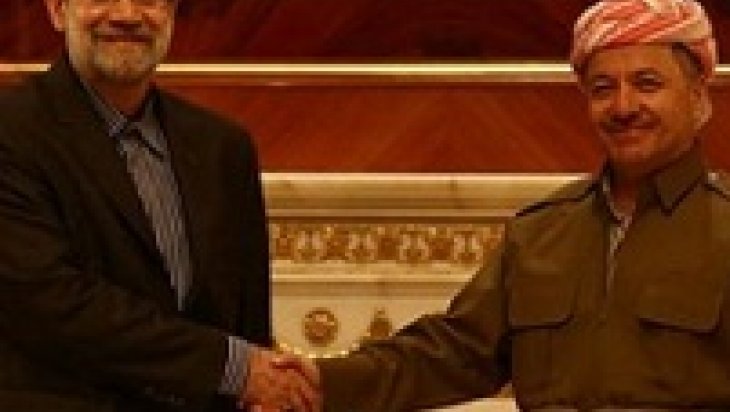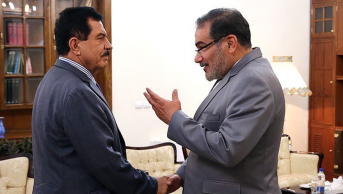Iran-KRG Relations Within The Grip Of Distrust

While discussing relations between Iranians and Kurds, it has almost become a custom to recall cultural, historical and linguistic proximities between the two peoples. However, political considerations and security concerns have become more decisive than identity politics in shaping relations between the modern Iranian state and the Iraqi Kurds. This trend has not changed after the Islamic Revolution in Iran. The Provisional Government in Tehran cooperated with the KDP (Kurdistan Democratic Party) led by Masoud Barzani, then took shelter in Iran, in order to suppress the Iranian Kurdish uprising that emerged soon after the revolution. That cooperation between Iran and the KDP was boosted further during the eight-year Iran-Iraq war. Then, the KDP fought, along with the Iranian forces, against their common enemy, Iraq under the rule of Saddam Hussein. In the meantime, the PUK (Patriotic Union of Kurdistan) under the leadership of Jalal Talabani established close relations and engaged in cooperation with Iran from the mid-1980s onwards. Despite the ebbs and downs, close relations between Iran and the Iraqi Kurdish parties continued throughout the 1990s. In this period, almost all of the Iraqi Kurdish movements opened political bureaus in Tehran. Thus, Iran served as a door for the Iraqi Kurds to open to the world. In turn, Iranian intelligence and security organizations established non-official security points inside the Iraqi Kurdistan region and thereby, Iranian influence over the Kurds has been increased.
Relations between Iran and the Iraqi Kurds: From the Political Parties Level to the 'Inter-Governmental' One
The close relationship between Iran and the Iraqi Kurds were effective in the process of restructuring post-occupation Iraq after 2003. Iran was the only regional country that supported federalism in Iraq; that is, the Kurdish demands for autonomy. It also supported the Kurds to be effective in Iraqi politics in alliance with the Iraqi Shiites. Thus, Iran increased its power over both the Iraqi Kurds and the Iraqi politics.
The recognition of 'Iraqi Kurdistan' as a federal region by the Constitution of 2005 opened a new phase in relations between Iran and the Iraqi Kurds. In order to coordinate its activities outside Iraq, the Kurdistan Regional Government (KRG) formed a special department in 2006. There have been two specific directorates within the Department of Foreign Relations to coordinate KRG’s relations with Iran and Turkey. In addition to the bureaus of the Iraqi Kurdish parties in Iran, the KRG opened a 'representation office' in Tehran in 2007. As to Iran, it became the first country to open consulates in Erbil and Sulaymaniyah. Hence, the relationship between Iran and the Iraqi Kurds ascended from political parties' level to a diplomatic or 'intergovernmental' level. After then, Masoud Barzani visited Tehran in 2008 as the 'President of the Iraqi Kurdistan Region'.
Economic interactions between Iran and the KRG considerably increased in this new stage, and Iran became the second largest trade partner of KRG after Turkey. There are three customs gates -Bashmakh, Parviz Khan, and Haji Omran- active along the 600-km long joint border between Iran and the Iraqi Kurdistan Region. Currently total volume of trade transactions between Iran and the KRG is around 4-4.5 billion US dollar. Iran exports food, agricultural products, textile, automotive spare parts etc. to the Iraqi Kurdistan. Iranian companies are active in the region in the projects related to infrastructure, dam building, and highway and construction projects. There are more than 470 Iranian companies registered in the region, and more than 20 thousand Iranian nationals are working in the region as either permanent or seasonal labor force. Mahan Air of Iran has scheduled flights between Erbil and Tehran three times per week. However, the flights between Erbil and Urumiyeh, and Sulaymaniyah and Tehran were suspended for not being economical. Additionally, there are regular coach services between the provinces located at the border area, especially between Erbil and Urumiyeh. Iranian provincial administrations, specifically those adjacent to the border, are authorized to establish direct contacts with their Iraqi Kurdish counterparts in order to boost bilateral trade transactions, and cultural and political relations. Hence, economic and cultural bonds between the local authorities are improved.
Energy issues constitute a remarkable part of Iran-KRG economic relations. Soon after the emergence of disagreements between Erbil and Baghdad over the management and marketing of oil resources, the KRG exported crude oil with tankers to international markets via Turkish and Iranian soils. Iran and KRG made a preliminary agreement on energy cooperation in April 2014. Accordingly, they decided to install twin pipelines between Iran and the Iraqi Kurdistan Region; one for pumping crude to refineries in Iran, and another for the transfer of refined oil back to the region. They also agreed that Iran would supply fuel for power plants in the Iraqi Kurdistan Region.
Crisis of Trust in Iran-KRG Relations
Despite deep and close ties between Iran and the Iraqi Kurds, Erbil-Tehran relations have not been transformed into a 'strategic' cooperation. The initial enthusiasm of the parties to enhance bilateral relations, economic and political interactions made no headway in the last decade. In other words, the harmony of politics between Iran and the Iraqi Kurds, particularly the KDP, gradually vanished. The primary reason for this is the collapse of the Baath regime in Baghdad that had been a common threat for both Iran and the Iraqi Kurds, thereby, had forced them to cooperate. The value of Erbil-Tehran alliance further diminished with the establishment of a new regime in Baghdad that is friendly to Iran and relatively weak to threaten the KRG. Moreover, Iran has prioritized its relations with Baghdad, and supported the Baghdad government against Erbil in case of a tension between the two. Additionally, the KRG, having consolidated its autonomous status and authority, has engaged in improving its relations with regional and extra-regional powers in order to diversify its economic and political relations. However, Tehran has been concerned with those activities, especially with the enhancement in Israeli-Kurdish relations.
Against this background, KRG officials, particularly the KDP, viewed the Iranian influence and its intelligence presence in the region as a threat. Indeed, due to its power in the region, Iran has frequently involved in Iraqi Kurdish politics, and intimidated KRG officials. It is claimed that Iran has hundreds of 'safe houses' that are used in its clandestine activities in the region. That is why KRG officials are refrained from publicly criticizing Iran. In fact, Mawlud Afand, editor-in-chief of Israel-Kurd magazine based in Erbil was kidnapped in June 2012, in Sulaymaniyah. Many people charged Iran for the abduction of Afand. Iran, however, preserved its close relations with the parties in the region, particularly with the PUK, besides its official diplomatic ties with the KRG. Furthermore, it is reported that Iran mediated between principal factions that competed for the leadership of the party during the illness of Talabani. Hawlati, a daily printed in the region, published a leaked diplomatic cable citing a conversation between Nechirvan Barzani, Prime Minister of the KRG, and a senior American diplomat. According to the cable, Barzani expressed his concerns about a possible increase in the Iranian power in areas under the influence of PUK in case Talabani would pass away. The cable added that KDP members were praying for Talabani’s well being in order to ward off any danger coming from Iran.
Moreover, as a result of its expanding 'autonomy' and a growing self-confidence, the KRG began to feel uncomfortable with the Iranian view of the Iraqi Kurds as a useful instrument for Iran’s regional policies, and anticipated to gain a more 'respectable' role in its relations with Iran. Indeed, for long years Iran coordinated its relations with the KRG through low-ranking officials and the Revolutionary Guards. Although the KRG officials including President Barzani paid numerous visits to Tehran in response to invitations from Iran or for other reasons where they were welcomed by high-level authorities, the Iranian high-level officials abstained from visiting Erbil until recently.
As a reaction to the 'patronizing' and 'interventionist' attitudes of Iranian officials towards the KRG, President Barzani did not visit Tehran since 2011. Although it was reported that he would pay a visit to Tehran in 2012, it was not realized. A development that displays the discomfort of KRG officials on this issue was happened in May 2014. It was an article addressing Iranian-Kurdish relations that was posted on the official website of Iranian consulate in Sulaymaniyah that sparked strong reactions on the side of KRG because it mentioned the Kurdish language as a dialect of the Persian, claimed that the Mahabad Republic of 1946 was a venture of communists, and warned that the separation of Kurds from Iraq would worsen Iranian-Kurdish relations. Likewise, some Iraqi newspapers reported that President Barzani visited Iran in July 2014, in which Iranian officials reportedly warned him about the intrusion of 'Peshmarga' forces into Kirkuk, problems in Erbil-Baghdad relations, and his decision to hold a referendum for independence. However, KRG Spokesman, Omid Sabah denied Barzani’s visit to Iran, and added, “Kurds will not ask any person’s permission to decide their destiny.”
The New Common Threat in Iran-KRG Relations: ISIS
Despite the estrangement between Iran and KRG, the rise of ISIS in June 2014 as a threat to KRG headed a new stage in Erbil-Tehran relations. Nechirvan Barzani visited Tehran on June 16, 2014 and met with Iranian security officials. Masoud Barzani wrote a letter in early August 2014 addressing Iranian President Hassan Rouhani that 'praised Iran for supporting Iraqi Kurds under the current tough circumstances'. He also acknowledged in late August that Iran is the first country that provides the KRG with arms and ammunitions against ISIS. Then, the 'fact' that 'Iran always helped the Iraqi Kurds during the difficult times' proved itself once more.
The rise of ISIS threat not only led to the revival of security cooperation between Erbil and Tehran, but also energized political relations between the two. Iranian Foreign Minister M. Javad Zarif paid the first high-level official to visit Erbil on August 26. Soon after Zarif’s visit to the region, Ali Larijani, Speaker of the Iranian Parliament, visited Erbil in December 2014. In his meeting with Larijani, President Barzani described the visit as the beginning of a new phase in relations between Iran and KRG.
The revival of security and political relations between Erbil and Tehran boosted attempts to improve economic relations. The parties agreed in November 2014 to establish free trade zone in Penjwen, a town at the border of Iran and KRG. Rostam Qasimi, who is in charge of improving economic relations between Iran and Iraq, visited Erbil in last February. They talked on the preliminary agreement for Iran’s import of crude oil from the region and its export of refined oil. During the visit, they also addressed a project to construct a railway between Sulaymaniyah and Kermanshah.
In conclusion, there are two points come into prominence in Iran’s relations with the KRG. The first one is the common threat perception between the parties. The second one is lack of trust between Iran and Iraqi Kurds despite their decades-old cooperation. While common threat perceptions of Iran and the Iraqi Kurds results in close relations between them, the removal of that threat resurfaces the issue of distrust. The issue of distrust between Erbil and Tehran derives from differences in strategic orientations and asymmetric power relations between the parties. Iran is concerned with the prospective ethnic-based regional policies of the KRG, its ambitions to be independent, and its potential cooperation with enemies of Tehran. In return, the KRG is anxious with Iranian influence over the region and its bullying activities over the Iraqi Kurds. Although being in need of Iranian support, the KRG has engaged in diversify its political and economic partners in order to limit Iran’s influence in the region. The rise of ISIS as a common threat led to the revival of political and security cooperation between Iran and the KRG, but the issue of distrust and asymmetric relations between the parties have remained unresolved.
This article was published in Ortadoğu Analiz journal with the title of "Iran-KRG Relations Within The Grip Of Distrust”











